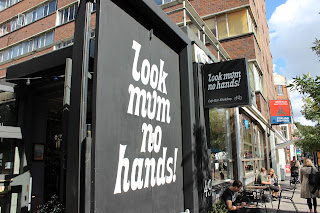Doing
Look mum no hands "clip it on" workshop
As part of the Artefact Cafe project we set-up a workshop at Look Mum No Hands, a truly great community bike shop. The shop itself has a great community of bike users, from commuters to couriers. The shop is set up as a cafe with a workshop. When you walk into the shop you are offered with free water, free air (for tyres) and access to a lock for your bike. There is a great range of food and drink as well as bike servicing. The community is a good reflection for what the project was looking for. We installed some Up Rapid prototyping machines in the retail space for two days. Participants signed up for a workshop where they were signed a design team and used our catalogue of parts to clip something on to their bike.
We were not there to design bike parts due to the prototype nature of the technology and ensure safety. The participants were taken through the ethics process and made aware of the prototype nature of the workshop. there were retail fixtures but we had rules about the workshops, ie not competing with the shop. There was a great response from passers by, people who already use the shop with suggestions and possibilities. I will leave most of the results to be published by the Artefact cafe blog. These workshops were part of London design week. The testing of rapid prototyping in retail spaces leaves quite allot of holes, that I am sure people will comment on but this has also been in the news as New York gets its first high street shop with 3D printers installed in it. I have been asked many times what my opinions are on 3D printing. It is an amazing technology but it is still a clever pen, I like to think of it as the 2d printing press. When the printing press was created it enabled the distribution of material and communication to a wide audience enabling more viewpoints and information. The information and distribution is the interesting factor, the same is to be said of 3D printing, to be able to manufacture to a power of 1 or manufacture on a distributed network by amateurs and professionals.. now that is interesting.
There were discussions on Intellectual property and 3D printing, how this can change the world, are we just giving people the access to producing crap? What are the next steps... This discussion is huge and be added to. There were some points raised on twitter criticising why we did this, but I think that they took things out of context.. always remember the context.
Beekeeping Hackday at the Honey Club
As part of the recent project with the Honey club, we invited a group of beekeepers to the offices at Wolff Olins. There were beekeepers from all over the country; Sheffield, Cambridge and London. There was a great mix of traditional and urban beekeeping. There were a series of activities to get participants design decisions. "I was just allowed to give my thoughts and did not have to think to much" comment from participant. It was important to have a clear outline and give a briefing on design and getting the concept of a design brief over to a mixed group of non-designers and participants who clearly "make things". There was a great vibe between the community involved, it highlighted many needs, design areas and dimensions to a project. I would like to thank all the people that were involved in making this happen. I will publish results, key findings, dimensions and next steps...
Reading
The Geek Manifesto, Mark Henderson. A very insightful publication into the politics funding and aspects of science, well worth a read.
Monitoring matters; examining the potential of locally based approaches.
Educating citizens about their coastal environments; beach profiling in the coast watch project.
Community based monitoring frameworks; increasing the effectiveness of environmental stewardship
The nature of research, Bruce Archer
Nokia open studio; engaging communities, Jan Chipchase
Customer driven product design and evaluation for collaborative design environments, Chen Liu
Lev Manovich, remixing and remixability












0 comments:
Post a Comment